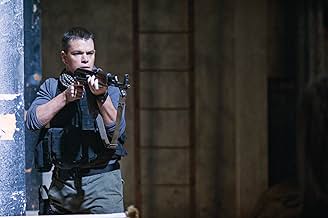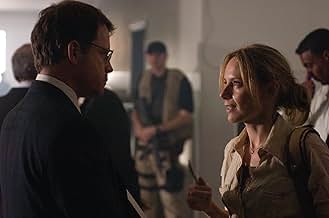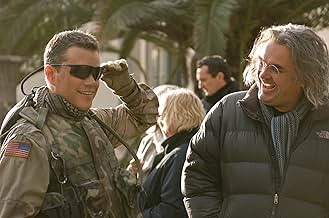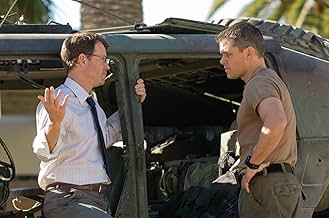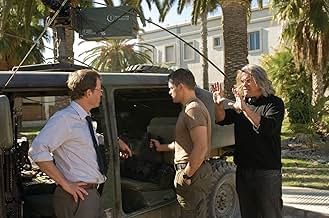Nach der Invasion des Irak 2003 wird der Army-Offizier Roy Miller damit beauftragt, die laut Pentagon vorhandenen Massenvernichtungswaffen im Lande aufzuspüren. Dabei kommt Miller einer groß... Alles lesenNach der Invasion des Irak 2003 wird der Army-Offizier Roy Miller damit beauftragt, die laut Pentagon vorhandenen Massenvernichtungswaffen im Lande aufzuspüren. Dabei kommt Miller einer großangelegten CIA-Verschwörung auf die Spur.Nach der Invasion des Irak 2003 wird der Army-Offizier Roy Miller damit beauftragt, die laut Pentagon vorhandenen Massenvernichtungswaffen im Lande aufzuspüren. Dabei kommt Miller einer großangelegten CIA-Verschwörung auf die Spur.
- Regie
- Drehbuch
- Hauptbesetzung
- Auszeichnungen
- 6 Nominierungen insgesamt
Faycal Attougui
- Al Rawi Bodyguard
- (as Faical Attougui)
Michael J. Dwyer
- Met-D
- (as Michael Dwyer)
Empfohlene Bewertungen
The new offering from Paul Greengrass is an intriguing progression from his previous films. Marrying the political engagement of films such as 'Bloody Sunday' with the blockbuster attraction of the Bourne films, 'Green Zone' was always going to promise attractive viewing, and it doesn't disappoint.
Matt Damon's character, Chief Warrant Officer Roy Miller, is in charge of an American Armed Forces unit in search of Weapons of Mass Destruction during the early stages of the Iraq conflict. When their search proves fruitless, Miller begins to question the supposedly 'solid' intelligence that gave the locations of these WMD sites. The plot follows Miller's demand for answers from an unstable command desperate to hide them, revealing a political division at the heart of the U.S administration.
Yes, this is fiction, but Greengrass has become adept at tapping into our taste for conspiracy, contextualising his stories within a political reality that has become all too familiar to us since the invasion began in 2003. It's thrilling stuff, and I think that is the key word to remember when watching this film. Thriller. Yes, there is political content here, and yes, it does hold up to some scrutiny. For example, the opening of the movie portrays the sense of confusion of conflicting command structures particularly well, really getting into the disorientation and intrigue of a military operation that isn't going as planned. The role of journalist Laurie Dayne (played by Amy Ryan) also provides a well-executed analysis of how the media's coverage of the facts can be impaired by the manoeuvrings of political and military authority.
There are moments when this political engagement appears heavy-handed, but that is because the director's priority is always, first and foremost, entertainment. For example, there is nothing subtle about Damon's character walking into a scene of Americans drinking and lounging by the pool of one of Saddam Hussein's palaces. Furthermore, the film suffers from conventional Hollywood stereotypes when it tries to depict the 'downtrodden-yet-hopeful' Iraqi citizen, who works with Miller in order to expose the truth about his country. Khalid Abdalla (best known for his lead role in 'The Kite Runner') does his best with the material available, but the role lacks depth and complexity, and for me is one of the few disappointments of the film.
But, as I said, this a work of fiction, and there are plenty of moments where our taste for excitement and spectacle is satisfied. Greengrass' now familiar 'handycam' filming style is appropriate to the sense that we are never sure as an audience where the threat is going to come from. It provides a kick of adrenaline to the action sequences, making us feel the sand in our mouths as we are thrown to the floor, and adds docudrama realism to the events on screen. Some of the reviews I have seen complained about this style of cinematography, but I think Greengrass has managed to make the technique contribute to the content of his film, rather than becoming overly intrusive or threatening our cinematic experience.
There is a delicious feeling of melodrama to the piece as a whole – the moustached Jason Isaacs as the sinister Special Forces operative provides a gripping counterbalance to the inquiring Matt Damon. Brendan Gleeson is superb as the CIA agent that won't roll over and accept the demands of the military and political commanders. Indeed, the cast as a whole appears to work well together in a film that successfully marries the need for political engagement with the desire for cinematic spectacle. It is a film designed for box office appeal, and yet despite this it doesn't compromise on the political foundations on which it is based. Its climax is a fine reward for the audience's suspense – in short, a well-worked film that cuts to the heart of our craving for conspiracy and revelation.
James Gill (Twitter @jg8608)
Matt Damon's character, Chief Warrant Officer Roy Miller, is in charge of an American Armed Forces unit in search of Weapons of Mass Destruction during the early stages of the Iraq conflict. When their search proves fruitless, Miller begins to question the supposedly 'solid' intelligence that gave the locations of these WMD sites. The plot follows Miller's demand for answers from an unstable command desperate to hide them, revealing a political division at the heart of the U.S administration.
Yes, this is fiction, but Greengrass has become adept at tapping into our taste for conspiracy, contextualising his stories within a political reality that has become all too familiar to us since the invasion began in 2003. It's thrilling stuff, and I think that is the key word to remember when watching this film. Thriller. Yes, there is political content here, and yes, it does hold up to some scrutiny. For example, the opening of the movie portrays the sense of confusion of conflicting command structures particularly well, really getting into the disorientation and intrigue of a military operation that isn't going as planned. The role of journalist Laurie Dayne (played by Amy Ryan) also provides a well-executed analysis of how the media's coverage of the facts can be impaired by the manoeuvrings of political and military authority.
There are moments when this political engagement appears heavy-handed, but that is because the director's priority is always, first and foremost, entertainment. For example, there is nothing subtle about Damon's character walking into a scene of Americans drinking and lounging by the pool of one of Saddam Hussein's palaces. Furthermore, the film suffers from conventional Hollywood stereotypes when it tries to depict the 'downtrodden-yet-hopeful' Iraqi citizen, who works with Miller in order to expose the truth about his country. Khalid Abdalla (best known for his lead role in 'The Kite Runner') does his best with the material available, but the role lacks depth and complexity, and for me is one of the few disappointments of the film.
But, as I said, this a work of fiction, and there are plenty of moments where our taste for excitement and spectacle is satisfied. Greengrass' now familiar 'handycam' filming style is appropriate to the sense that we are never sure as an audience where the threat is going to come from. It provides a kick of adrenaline to the action sequences, making us feel the sand in our mouths as we are thrown to the floor, and adds docudrama realism to the events on screen. Some of the reviews I have seen complained about this style of cinematography, but I think Greengrass has managed to make the technique contribute to the content of his film, rather than becoming overly intrusive or threatening our cinematic experience.
There is a delicious feeling of melodrama to the piece as a whole – the moustached Jason Isaacs as the sinister Special Forces operative provides a gripping counterbalance to the inquiring Matt Damon. Brendan Gleeson is superb as the CIA agent that won't roll over and accept the demands of the military and political commanders. Indeed, the cast as a whole appears to work well together in a film that successfully marries the need for political engagement with the desire for cinematic spectacle. It is a film designed for box office appeal, and yet despite this it doesn't compromise on the political foundations on which it is based. Its climax is a fine reward for the audience's suspense – in short, a well-worked film that cuts to the heart of our craving for conspiracy and revelation.
James Gill (Twitter @jg8608)
The Green Zone is that rarest of films—a well-written, rousing action thriller with a political conscience that perceptively deconstructs the idiocy of war. From the very first scene, the action grabs you and throttles you for the ensuing two hours—although the story is fairly complex, the exposition is handled deftly, and—despite the constantly jolting camera work—it's pretty easy to follow along with what's happening. Matt Damon delivers a strong performance as an Army Warrant Officer who truly cares about the justifications for his actions—he has no problem being a good soldier, as long as he knows that there are clear moral reasons behind what he's been ordered to do. Unfortunately, during the early days of the Iraq War, clear moral reasons were in very short supply, and Damon's character battles an array of competing military and political agendas as he searches for the truth behind the military's search for the ever-elusive Weapons of Mass Destruction rumored to be hidden in Iraq. This film is so well done, and Damon is so good in it, that I'm starting to consider the Greengrass/Damon tandem on a par with the Scorsese/DeNiro and Scorsese/DiCaprio pairings. Damon's best work (the last two Bourne films and this one) has come with Greengrass at the helm—here's to hoping they make many more fine films together.
Feel like seeing an action flick, watching bodies fly everywhere, and good guys kill bad guys? Do not see this movie.
Green Zone was a very surprising experience for me. I was on the way to the cinema expecting, as several posters quoted, 'Born goes epic'. Instead, I got a nice combination of politics, moral dilemmas, and maybe even some very light philosophy.
The film takes a popular, but still a controversial & for many people shameful, view on the Iraq war. The plot is complex but relatively easy to follow thanks to a(sometimes too) straight-forward set up, good directing, and sensible scene sequences. The plot does not bring you any traditional action flick twists and rarely pushes you to the edge of the seat, but makes up for it by making you think about some of the more real and worrying aspects of war and politics. The characters could have used some more development and dynamic, but on the bright side it was nice to not have every single thing rotate around Bourne. On the contrary, throughout the whole movie the focus was on a wider picture rather than on any of the more specific details in the story itself. It was nice to see the lines between bad & good drawn in such a blurry manner. I was confused and indecisive in labelling characters as on the goody or the baddie side. The plot had an interesting ending, slightly ruined by a cheesy line from one of the characters, but brilliantly made up for by a fantastic scene of Baghdad at night. I found that whilst the epilogue of the movie was needed to explain consequences, something like a few sentences appearing on a black screen would have finished the movie in a much nicer mood than that in which it finished in reality. The plot took up an intellectual viewpoint on the Iraq war and gave me something to think about on the subject of both the Iraq war and the idea of war in general. This was something that you rarely see in movies like this, and made the movie the enjoyable experience that it is.
The directing & cinematography in the movie were nothing special. Several style ideas were re-used from the Bourne movies, and action was not always as gripping as one might want, or at least expect. However, it was never bad either - all sequences kept a consistent standard of dialogue, special effects, and the little action that there was.
The acting in the movie was one of the few things that I expected. Matt Damon delivered his usual performance: a cool, in-control soldier committed to get to the bottom of things. The supporting actors all delivered their parts well enough, with Greg Kinnear holding his usual cunning, conniving, corrupt, money-thirsty politician role. However, because, as mentioned before, the film focused on a wider picture, the acting did not put me off the movie in any way whatsoever. The one other thing which the movie lacked almost entirely throughout was humour. It's always nice to get a giggle in between moral implications and people dying all over the place.
I have given the movie 7 out of 10 in total, with seven points for wider plot depth, intellectual aspects, directing & cinematography, CGI & special effects, and the last three points deduced for acting, immediate plot depth, action sequences, and humour, or rather the lack of it. It's a pleasant and original surprise, and something that will make you think after leaving the cinema.
MK
Green Zone was a very surprising experience for me. I was on the way to the cinema expecting, as several posters quoted, 'Born goes epic'. Instead, I got a nice combination of politics, moral dilemmas, and maybe even some very light philosophy.
The film takes a popular, but still a controversial & for many people shameful, view on the Iraq war. The plot is complex but relatively easy to follow thanks to a(sometimes too) straight-forward set up, good directing, and sensible scene sequences. The plot does not bring you any traditional action flick twists and rarely pushes you to the edge of the seat, but makes up for it by making you think about some of the more real and worrying aspects of war and politics. The characters could have used some more development and dynamic, but on the bright side it was nice to not have every single thing rotate around Bourne. On the contrary, throughout the whole movie the focus was on a wider picture rather than on any of the more specific details in the story itself. It was nice to see the lines between bad & good drawn in such a blurry manner. I was confused and indecisive in labelling characters as on the goody or the baddie side. The plot had an interesting ending, slightly ruined by a cheesy line from one of the characters, but brilliantly made up for by a fantastic scene of Baghdad at night. I found that whilst the epilogue of the movie was needed to explain consequences, something like a few sentences appearing on a black screen would have finished the movie in a much nicer mood than that in which it finished in reality. The plot took up an intellectual viewpoint on the Iraq war and gave me something to think about on the subject of both the Iraq war and the idea of war in general. This was something that you rarely see in movies like this, and made the movie the enjoyable experience that it is.
The directing & cinematography in the movie were nothing special. Several style ideas were re-used from the Bourne movies, and action was not always as gripping as one might want, or at least expect. However, it was never bad either - all sequences kept a consistent standard of dialogue, special effects, and the little action that there was.
The acting in the movie was one of the few things that I expected. Matt Damon delivered his usual performance: a cool, in-control soldier committed to get to the bottom of things. The supporting actors all delivered their parts well enough, with Greg Kinnear holding his usual cunning, conniving, corrupt, money-thirsty politician role. However, because, as mentioned before, the film focused on a wider picture, the acting did not put me off the movie in any way whatsoever. The one other thing which the movie lacked almost entirely throughout was humour. It's always nice to get a giggle in between moral implications and people dying all over the place.
I have given the movie 7 out of 10 in total, with seven points for wider plot depth, intellectual aspects, directing & cinematography, CGI & special effects, and the last three points deduced for acting, immediate plot depth, action sequences, and humour, or rather the lack of it. It's a pleasant and original surprise, and something that will make you think after leaving the cinema.
MK
This movie is not a sequel to Bourne flicks. It is more in the spirit of Costa-Gravas or Oliver Stone. MET Alpha is Mobile Exploitation Team Alpha. The 85th XTF is the 75th Exploitation Task Force. CWO Miller is CWO Gonzalez. The reporter is, of course, Judith Miller, the New York Times (not WSJ) reporter who sold out to the Bush administration to get bylines. She used her position as shill for Rummy to keep MET Alpha in Baghdad, chasing their tails while American soldiers died trying to find non-existent WMD, for the sole purpose of backing up Bush's lies. Miller's folio is full of information from Curveball (Magellan). The CIA, who knew Curveball was a liar, was also warning Miller. A perpetually smiling Ahmad Chalabi keeps popping up. He is no doubt thinking how fine it is for the US Army to hand him an entire country along with a treasury of several hundred million dollars.
Miller is angry because he knows his intelligence is bogus, the CIA has told him that much, even though the Army vouches for it, and tells Miller to shut up and follow orders.
The Pentagon puke tries to bribe Miller with a job if he plays along, and offers a veiled threat if he doesn't.
The movie is history, and not a simple action adventure flick. It follows actual events very closely. Knowing the facts makes the movie much more fascinating.
Miller is angry because he knows his intelligence is bogus, the CIA has told him that much, even though the Army vouches for it, and tells Miller to shut up and follow orders.
The Pentagon puke tries to bribe Miller with a job if he plays along, and offers a veiled threat if he doesn't.
The movie is history, and not a simple action adventure flick. It follows actual events very closely. Knowing the facts makes the movie much more fascinating.
British director Paul Grengrass + American actor Matt Damon = "The Bourne Supremacy", "The Bourne Ultimatum" and now "Green Zone", so we know what to expect here - and we're not disappointed. From the opening seconds, we're into the action with the trademark Greengrass 'in the action' frenetic camera-work and sharp editing. Although the film is said to be inspired by the non-fiction book "Imperial Life In The Emerald City" by Rajiv Chandrasekaran, a journalist for The Washington Post, the conspiratorial storyline is the invention of Greengrass who developed the original script.
If the tension isn't as excruciating at that other Iraq movie "The Hurt Locker", at least "Green Zone" has a narrative and poses some questions, hard questions that many American viewers would probably were rather not aired: what was the source of the 'intelligence' that Saddam Hussein possessed weapons of mass destruction? why was the source so readily believed when the evidence was so thin? could the bloody insurgency which followed the relatively easy initial occupation have been avoided if the Americans had been willing to work with elements of the Iraqi army?
See the movie and think about the issues. As a central Iraqi character puts it: "It's not up to you to determine what happens in this country."
If the tension isn't as excruciating at that other Iraq movie "The Hurt Locker", at least "Green Zone" has a narrative and poses some questions, hard questions that many American viewers would probably were rather not aired: what was the source of the 'intelligence' that Saddam Hussein possessed weapons of mass destruction? why was the source so readily believed when the evidence was so thin? could the bloody insurgency which followed the relatively easy initial occupation have been avoided if the Americans had been willing to work with elements of the Iraqi army?
See the movie and think about the issues. As a central Iraqi character puts it: "It's not up to you to determine what happens in this country."
Wusstest du schon
- WissenswertesMany of the soldiers in Matt Damon's WMD unit were actual Iraq War and Afghanistan War veterans, not actors. Damon said his biggest challenge was knowing he was an actor who was giving orders to actual soldiers.
- PatzerLike most films situated in the Middle-East this movie was filmed in Morocco. The streets are filled with French cars that you would not find in Iraq and scenes of men in crowds wearing the Moroccan common dress.
- SoundtracksAboun Salehoun
Written by Youssef El Mejjad, Pat Jabbar
Performed by Amira Saqati
Courtesy of Barraka El Farnatshi Prod.
Top-Auswahl
Melde dich zum Bewerten an und greife auf die Watchlist für personalisierte Empfehlungen zu.
Details
- Erscheinungsdatum
- Herkunftsländer
- Offizielle Standorte
- Sprachen
- Auch bekannt als
- La ciudad de las tormentas
- Drehorte
- Academia General del Aire, San Javier, Murcia, Spanien(Iraq exteriors)
- Produktionsfirmen
- Weitere beteiligte Unternehmen bei IMDbPro anzeigen
Box Office
- Budget
- 100.000.000 $ (geschätzt)
- Bruttoertrag in den USA und Kanada
- 35.053.660 $
- Eröffnungswochenende in den USA und in Kanada
- 14.309.295 $
- 14. März 2010
- Weltweiter Bruttoertrag
- 113.377.594 $
- Laufzeit1 Stunde 55 Minuten
- Farbe
- Sound-Mix
- Seitenverhältnis
- 2.35 : 1
Zu dieser Seite beitragen
Bearbeitung vorschlagen oder fehlenden Inhalt hinzufügen









